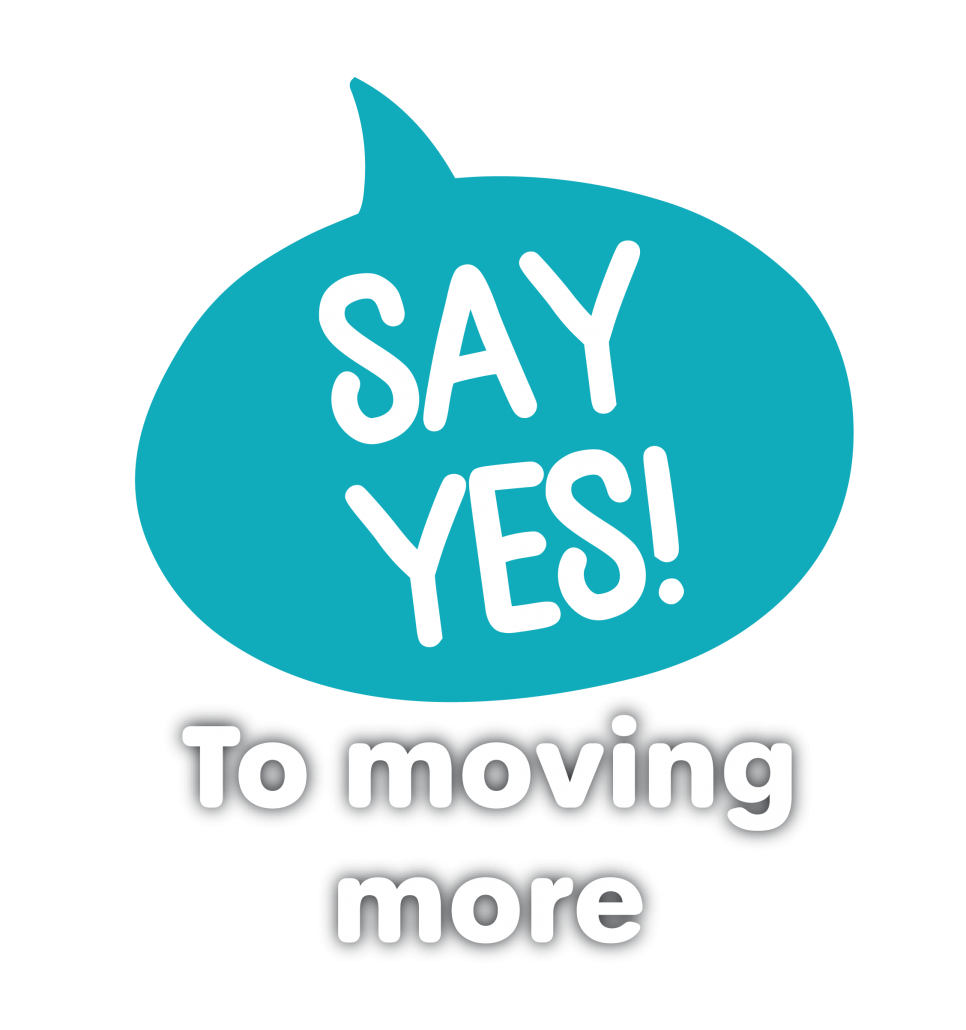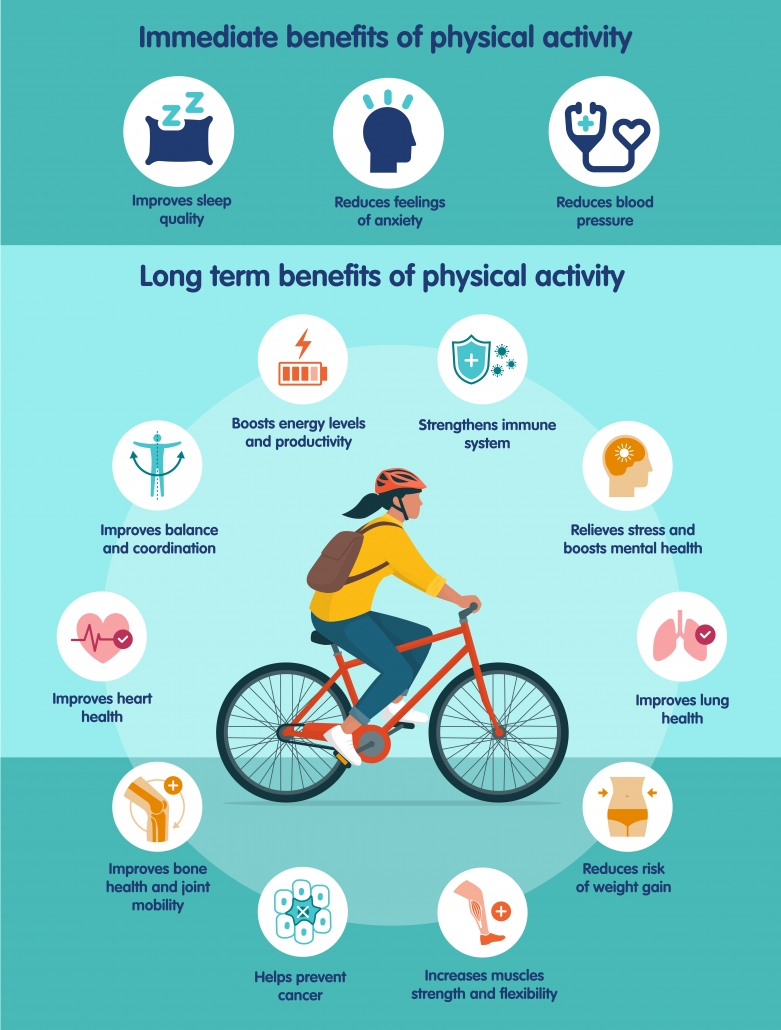I want to know more about being active
Exercise is a miracle cure, which can help to treat illnesses, stop you from becoming unwell in the first place and make you feel happier and healthier. From walking to playing sports to gardening – being physically active looks different for everyone, and there’s not one right way of becoming more active.
What counts as physical activity?
Lots of things can count as exercise – so it’s ok if you don’t like sports. Being active is anything that gets your body moving, and can include:
- Active living – such as, gardening, cleaning or DIY
- Active travel – such as, walking or cycling to get to a destination
- Active recreation – such as, walking for fun, dance, gym or yoga
- Informal sport – such as, having a kick about outside
- Organised sport – such as, being an active member of a sports club
How much physical activity should I be doing?
The Government publishes guidelines about how much exercise is recommended for people of different ages. These are guidelines to give you an idea of what it means to be physically active – but it’s important to remember that everyone starts somewhere and small steps to becoming more active can make a big difference to your overall health and wellbeing.
The guidelines for people of different ages are set out below.
Children and young people aged 5-18
It is recommended that children and young people aged 5 to 18 should:
- aim for an average of at least 60 minutes of moderate or vigorous intensity physical activity a day across the week
- take part in a variety of types and intensities of physical activity across the week to develop movement skills, muscles and bones
- reduce the time spent sitting or lying down and break up long periods of not moving with some activity. Aim to spread activity throughout the day
Adults 19-64
It is recommended that adults 19-64 should aim to:
- do strengthening activities that work all the major muscle groups (legs, hips, back, abdomen, chest, shoulders and arms) on at least 2 days a week
- do at least 150 minutes of moderate intensity activity a week or 75 minutes of vigorous intensity activity a week
- spread exercise evenly over 4 to 5 days a week, or every day
- reduce time spent sitting or lying down and break up long periods of not moving with some activity
Older adults – 65 and over
It is recommended that adults aged 65 and over should aim to:
- be physically active every day, even if it’s just light activity
- do activities that improve strength, balance and flexibility on at least 2 days a week
- do at least 150 minutes of moderate intensity activity a week or 75 minutes of vigorous intensity activity if you are already active, or a combination of both
- reduce time spent sitting or lying down and break up long periods of not moving with some activity
What counts as moderate aerobic activity?
Moderate activity will raise your heart rate, and make you breathe faster and feel warmer. One way to tell if you’re working at a moderate intensity level is if you can still talk, but not sing.
Examples of moderate intensity activities include:
- brisk walking
- water aerobics
- riding a bike
- dancing
- doubles tennis
- pushing a lawn mower
- hiking
- rollerblading
What counts as vigorous activity?
Vigorous intensity activity makes you breathe hard and fast. If you’re working at this level, you will not be able to say more than a few words without pausing for breath.
In general, 75 minutes of vigorous intensity activity a week can give similar health benefits to 150 minutes of moderate intensity activity.
Most moderate activities can become vigorous if you increase your effort.
Examples of vigorous activities include:
- running
- swimming
- riding a bike fast or on hills
- walking up the stairs
- sports, like football, rugby, netball and hockey
- skipping
- aerobics
- gymnastics
- martial arts
What counts as very vigorous activity?
Very vigorous activities are exercises performed in short bursts of maximum effort broken up with rest.
This type of exercise is also known as High Intensity Interval Training (HIIT).
Examples of very vigorous activities include:
- lifting heavy weights
- circuit training
- sprinting up hills
- interval running
- running up stairs
- spinning classes
What activities can strengthen muscles?
To get health benefits from strength exercises, you should do them to the point where you need a short rest before repeating the activity.
There are many ways you can strengthen your muscles, whether you’re at home or in a gym.
Examples of muscle-strengthening activities include:
- carrying heavy shopping bags
- yoga
- pilates
- tai chi
- lifting weights
- working with resistance bands
- doing exercises that use your own body weight, such as push-ups and sit-ups
- heavy gardening, such as digging and shovelling
- wheeling a wheelchair
- lifting and carrying children
What can I do to help myself?
Getting help, what are the options?
There are lots of amazing activities in and around Rotherham to help you get moving more.
I want to find out more about activities in Rotherham
This tool is in development. If you want your organisation to appear here, please click here.
I would like to find out more about cycling in Rotherham
Journey Matters can help you with:
- Borrowing a bike for three months for free (including electric bikes)
- Getting your bike checked over by expert mechanics
- Planning your cycling adventures
- Updating your cycling skills by signing up to a free cycle course
If you would like map your route, our cycle map will help you to find purpose made cycle routes such as the Trans–Pennine Trail or the Rotherham Canal Side Walk and Cycle Way. It also includes on road cycle lanes, cycle paths and many other things useful to cyclists.
I want to follow an online exercise program
There are lots of exercise programmes that you can follow online, including:
Couch to 5K
A running plan for absolute beginners. It was developed by a new runner, Josh Clark, who wanted to help his 50-something mum get off the couch and start running, too.
The plan involves 3 runs a week, with a day of rest in between, and a different schedule for each of the 9 weeks.
Active 10
The Active 10 app anonymously records every minute of walking you do. Just pop your phone in your pocket and away you go!
The app:
- tracks your steps
- helps you set goals
- shows you your achievements
- gives you tips to boost your activity
Better Health home workout videos
A collection of videos that includes exercises you can do from your home, including cardio, strengthening and warm-down stretching.
I have a long-term condition and would like to be more active
Being physically active can help you to manage your long-term condition, but it can be daunting for some people to get active.
General advice is available in the pages below:
Active for Life Solutions is a stand-alone not-for-profit organisation working in Rotherham. They aim to tackle and overcome the barriers to exercise people with long-term health conditions face.
All rehabilitation pathways are evidence based and delivered by a team of Level 4 Exercise Specialists. To join one of the exercise pathways, sign off from a healthcare professional is required. To request a referral form please email Leon at Functional.fitness@nhs.net.
I am concerned about someone else
What can I do or how can I help?
Lots of people have trouble getting enough physical activity. If someone you care about is having a hard time getting active, you can help. Here are some tips to get you started.
Activities to do together
Suggest activities you can do together
- Start small — try taking a walk together after dinner twice a week or doing push-ups during adverts while you watch TV
- Mix it up — find different ways to move, like dancing or doing balance exercises
- Try something new — take a fitness class together or play a sport you both like
Make it part of your regular routine
- Meet up at the local gym or community centre on your way home from work
- Wake up a bit earlier so you can go for a brisk walk together before breakfast
- Pick a certain time for physical activity, like right after your favourite TV show
- Ride your bikes or walk to the local shops
Take time to understand their situation
What are the person you care about’s reasons for not being more active? For example, maybe they feel overwhelmed or embarrassed. Talk to them about what’s making it difficult to get physical activity — then ask what you can do to be supportive.
Recognise the effort
Recognising even the small amounts of effort can make a big difference!
- Be patient — change takes time
- Remember, any amount of physical activity is better than none!
- Offer encouragement and praise — you can say: “Great job getting a walk in today!”
- Point out positive choices — you can say: “I’m glad we’re walking to the park instead of driving”
Top Tips
Top tips
- Make it a part of everyday life – activities that get you moving more throughout the day, like cleaning or gardening count as physical activity.
- It’s about what works for you, so try to find an activity you enjoy.
- Build up gradually, as this will reduce your chance of injury.
- Exercise with a friend so you can support each other.
- Try not to compare yourself to other people and remember that this is your journey and fitness looks different on everyone.
Local support
Leisure centres
There are a wide range of activities available at your local leisure and sports centre, including:
- Swimming and swimming lessons
- Multi-purpose sports halls
- Squash, badminton and football courts
- Fitness suites
- Children’s holiday activities
- Workout classes
- MoreLife weight management programme
- GP referral programme
Rotherham United Community Trust
Rotherham United Community Trust (RUCT) is the charitable arm of Rotherham United F.C. Working across the borough, it delivers many topics and initiatives in the heart of the Rotherham Communities. With passions including health and wellbeing, youth and inclusion, sport participation, education and employability, the Trust aims to use the influence of the club to partner with local organisations and connect the people to create a lasting impact for both current and future generations.
Functional Fitness
Active for Life Solutions is a stand-alone not-for-profit organisation working in Rotherham. They aim to tackle and overcome the barriers to exercise people with long-term health conditions face.
All rehabilitation pathways are evidence based and delivered by a team of Level 4 Exercise Specialists. To join one of the exercise pathways, sign off from a healthcare professional is required.
Email: Functional.fitness@nhs.net
Rotherham Park Run
A free, fun, and friendly weekly 5k community event, held every Saturday at 9am in Clifton Park.
Walk, jog, run, volunteer or spectate – it’s up to you!
National support organisations
Sport England
We’re here to invest in sport and physical activity to make it a normal part of life for everyone in England, regardless of who you are.
Together, we can change lives for the better in every home, and in every community, right across the country.
NHS Better Health – Get Active
It’s the perfect time to get active. No matter how much you do, physical activity is good for your body and mind. Adults should aim to be active every day. Some is good – more is better still.
Support Apps
Rotherhive is not responsible for content on websites or apps mentioned on the site. Always read the app’s Terms and Conditions and Privacy Policy to see how your data may be used.







